" Dear Lord, please let me get just one more..."
"I don't know how I'm going to live with myself if I don't stay true to what I believe in.."
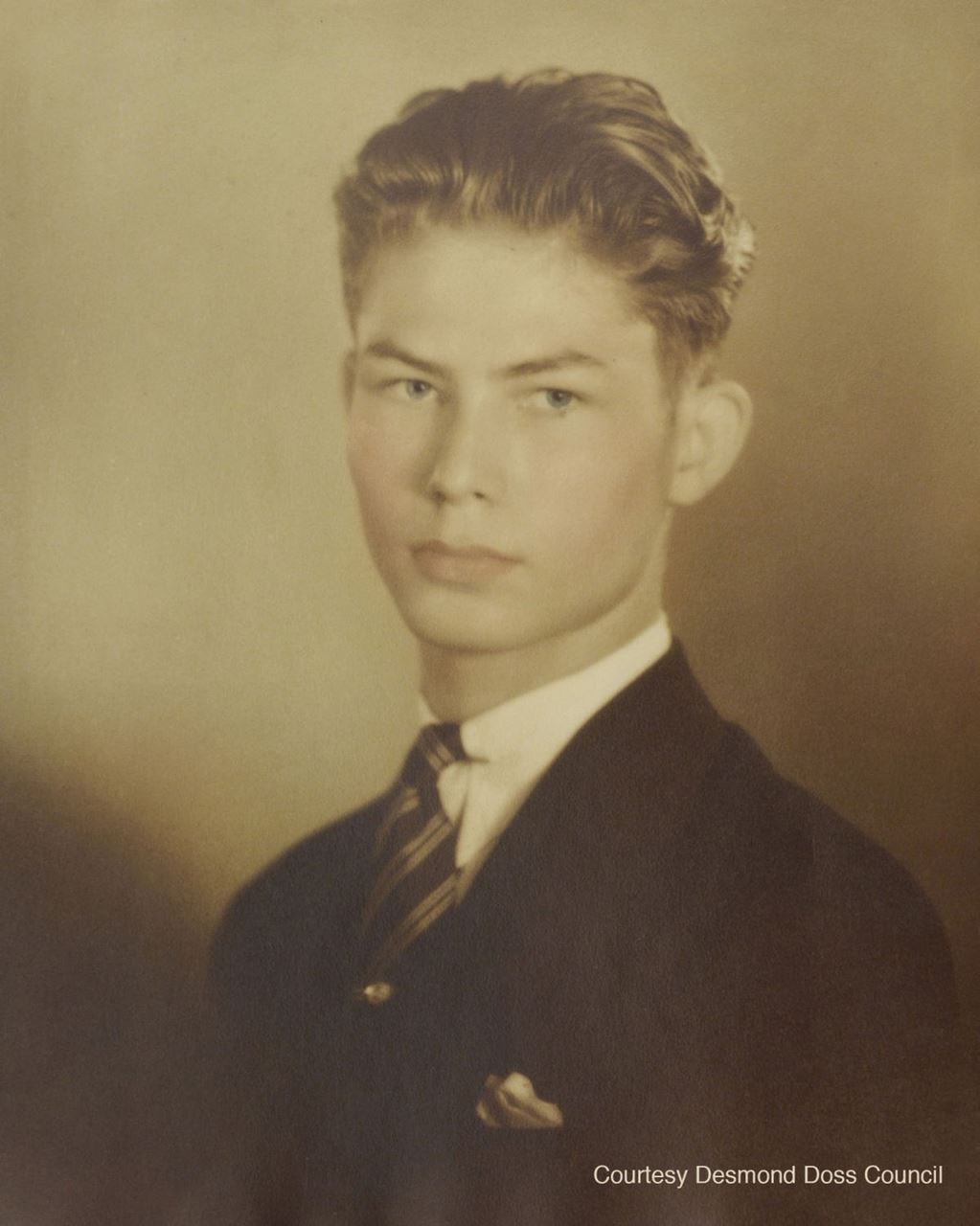 Desmond DossNewsadvance.com
Desmond DossNewsadvance.com
On the battlelines of Hacksaw Ridge, in Okinawa, Japan, soldiers were prepared to face the cold, noxious clasp of death. Desmond Doss, one particularly brave soldier, displayed his immense strength by single-handedly saving seventy-five wounded soldiers while under enemy fire. In 1942, Doss had enlisted into the United States Army and spent his time preparing to serve as an army combat medic. Desmond’s life had been a difficult one, to say the least. As a young child, he was subject to severe domestic abuse, which was believed to have been the root to his hatred of artillery. Despite the abuse, Doss had grown up in a very religious household and the Ten Commandments were a constant in his life. The Sixth Commandment always caught his eye: Thou shalt not kill. It depicted the biblical story of Cain and Abel. As he would see the grim photo of Cain killing his brother Abel, young Doss would question how one could commit such a horrific act towards another. From that day onward, Desmond Doss refused to ever lay a hand on a weapon. When enrolled into the army as a conscientious objector, Desmond had believed that he would not need to be carrying a gun due to his status, yet to his surprise, he was immediately sent to an infantry rifle company. Due to his opposition to violence and religious beliefs, he was victim to gruesome abuse from his associates and was even forced to see a psychologist to check his mental stability. Despite their cruelty, Doss was always free of loathing, “Things began turning around when the men discovered that this quiet unassuming medic had a way to heal the blisters on their march-weary feet. And if someone fainted from heat stroke, this medic was at his side, offering his own canteen. Desmond never held a grudge. With kindness and gentle courtesy, he treated those who had mistreated him,” (“Desmond Doss: The Real Story”). There was never a time where he had not followed his golden rule, “...do to others what you would have them do to you...” (Matthew 7:12). Without fear, Doss had put others first and was prepared to sacrifice himself to protect the lives of others. Desmond Doss’ altruistic and courageous ideals prove him to be a hero.
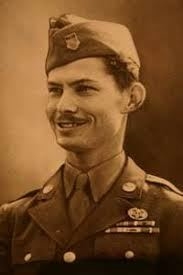 Desmond Dossbr.pinterest.com
Desmond Dossbr.pinterest.com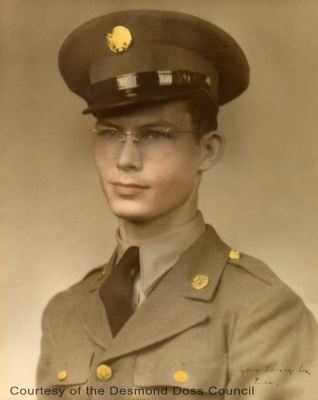 Desmond DossDesmonddoss.com
Desmond DossDesmonddoss.com
Doss had conveyed his altruistic sense through his actions in saving others. When he had offered his support, he had repeatedly done so with a target at his back. He had never once considered his own safety, which many say is foolish. However, his courage had the power to save a multitude of people. “He repeatedly ran into the heat of battle to treat a fallen comrade and carry him back to safety. All this, while enemy bullets whizzed past and mortar shells exploded around him. Several times, while treating a wounded soldier, Desmond was so close to enemy lines, he could hear the whispering of Japanese voices,” (“Desmond Doss: The Real Story”). Doss had enrolled in the military during the crisis of Pearl Harbor. From there, it had branched off to something more intense; the beginning of World War II. America and Japan were at each other's throats, and the power that both sides beheld was suffocating. Yet, despite all the odds, Desmond had looked into the eyes of fear and had shaken his hand. His exclusion to fear had enabled him to defend with great force and expel robust strength. As he rushed into battle, Doss had pinpointed out the injured soldiers and had ran to their aid. Those who had been unthankful, or had doubted his ability, he had too, done them well. He even helped save and protect injured Japanese. Doss never saw an enemy, he never understood the concept, he only saw each person injured in need of his help. They saw him as a liability and had not believed in his capabilities from the beginning. Yet, Desmond had proven them all wrong. After he had treated his fellow warriors, he still had yet to bring them to complete safety. To do so, he had been versatile in his tactics to move fast and quietly. “ After the company had secured the top of the cliff, the Americans were stunned when suddenly enemy forces rushed them in a vicious counterattack...Soldiers rushed to climb back down the steep cliff...Less than one third of the men made it back down. The rest lay wounded, scattered across enemy soil—abandoned and left for dead, if they weren't already. One lone soldier disobeyed orders and charged back into the fire fight to rescue as many of his men as he could, before he either collapsed or died trying. His iron determination and unflagging courage resulted in at least 75 lives saved that day, May 5, 1945, his Sabbath.” (“Desmond Doss: The Real Story”). Doss used pure will power to save those men that glorious day. “Over the span of several hours, Doss treated the injured and, one by one, dragged them to the edge of the cliff and lowered them to safety in a rope sling. After each successful delivery, he reportedly said, ‘Dear God, let me get just one more man.’ By nightfall, he had rescued 75 soldiers, including many of the men who had berated him earlier in his military career,” (“Desmond Doss: The Unlikely Hero Behind ‘Hacksaw Ridge’”). Despite the cruelty he had received, he did not discriminate and thought each inpidual was worth saving. Doss had harnessed his will and the spirit of God to give him the power to save so many; he was a force to be reckoned with.
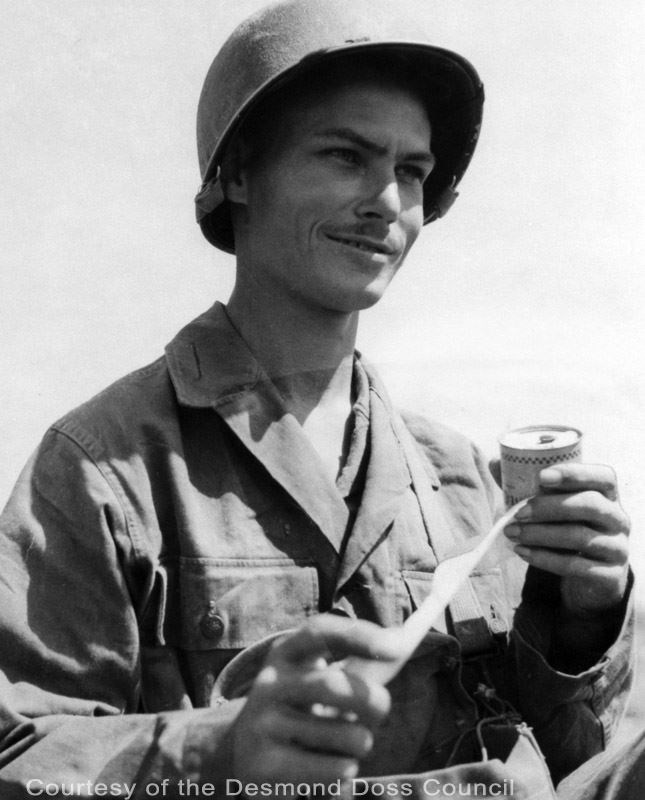 Doss in the armyDesmonddoss.com
Doss in the armyDesmonddoss.com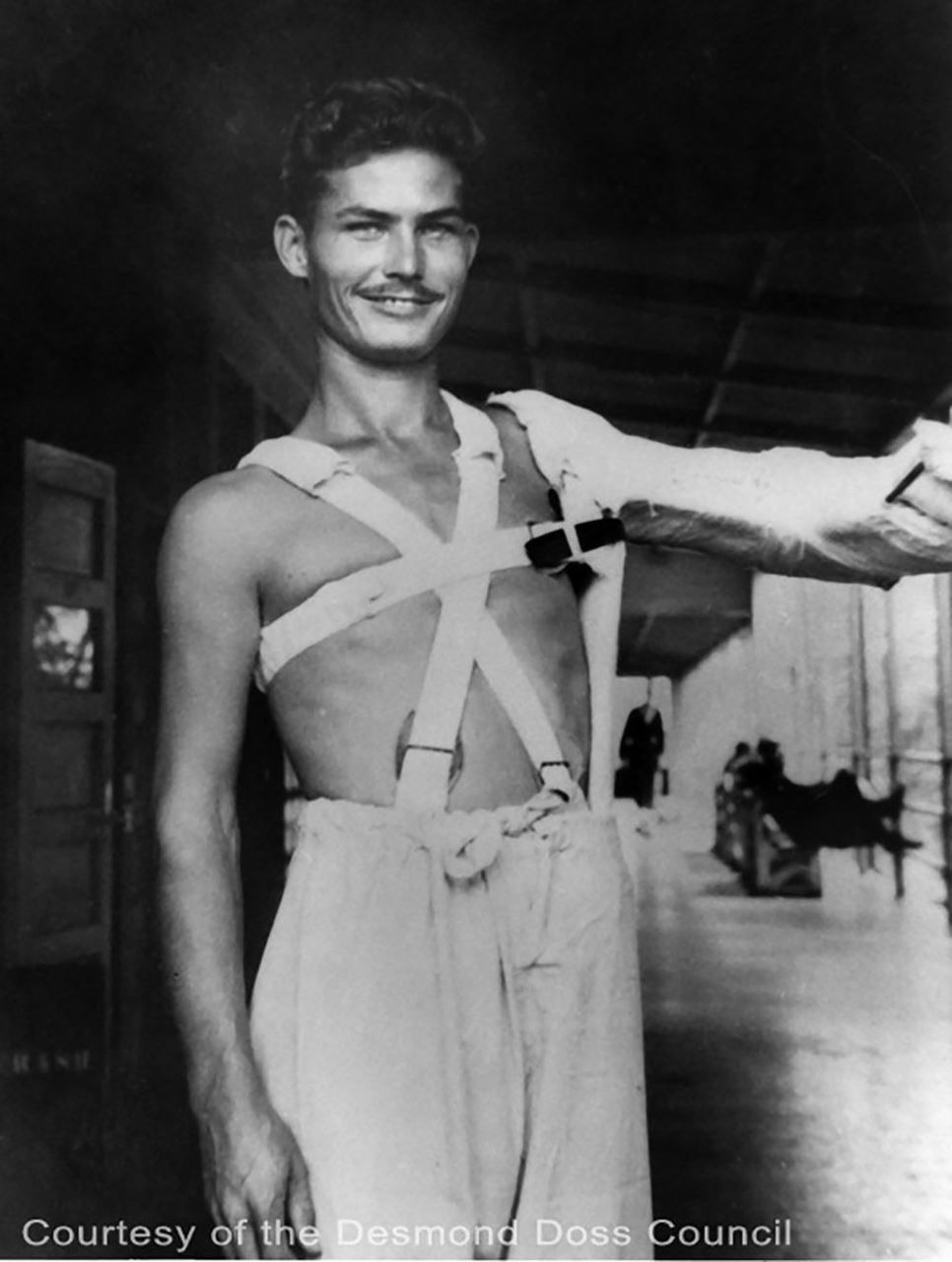 Desmond recovering after getting shotpilotonline.com
Desmond recovering after getting shotpilotonline.com
Desmond Doss would have credited his courage from the power of God. His strong faith in God however, had gotten him into a great deal of trouble. “Doss grew up in Lynchburg, Virginia, and was a Seventh Day Adventist, which meant he was a pacifist -- he didn't believe in violence and chose not to bear arms. His beliefs and his job as a defense industry worker provided him draft exemption during the war, but he dismissed that chance to defer. He wanted to serve his country, so he enlisted in the Army Medical Corps as a noncombatant. But because of his conscientious objector status -- including his refusal to handle duties on the Saturday Sabbath -- boot camp wasn't easy for him. He was threatened and harassed. Many of the other recruits threw shoes at him while he prayed, and they tried to have him transferred out of their unit,” (“Desmond Doss: The Unlikely Hero Behind ‘Hacksaw Ridge’”). Despite the harassment he had received from his peers, he persevered and had stayed true to what he had believed in. He did not let anything get in his way of doing what was right. Even when given direct orders to retreat, he knew in his heart that his duty to serve God and his country, was to stay. He had ran back into the flames of fury, denying all odds, he risked his life to save the lives of others. When daybreak had arrived and he had saved all the people he could, Desmond Doss had swung down the 400 foot cliff and was met with the support and utmost respect from his comrades. “His heroics didn't end there, though. Days later, as the Americans continued their slow advance, Doss was seriously wounded in the leg by a grenade. Instead of calling on another medic for help, he treated himself and waited five hours to be rescued. As he was being carried back to an aid station, his unit was attacked again. Doss insisted that another badly injured soldier take his spot on the stretcher. As he continued his trek on foot, Doss was hit by a sniper, shattering his arm...” (“Desmond Doss: The Unlikely Hero Behind ‘Hacksaw Ridge’”). Desmond had willingly given up his spot for treatment to help another. Desmond Doss had shown his heroic attributes by following the word of God, sacrificing himself and protecting others.
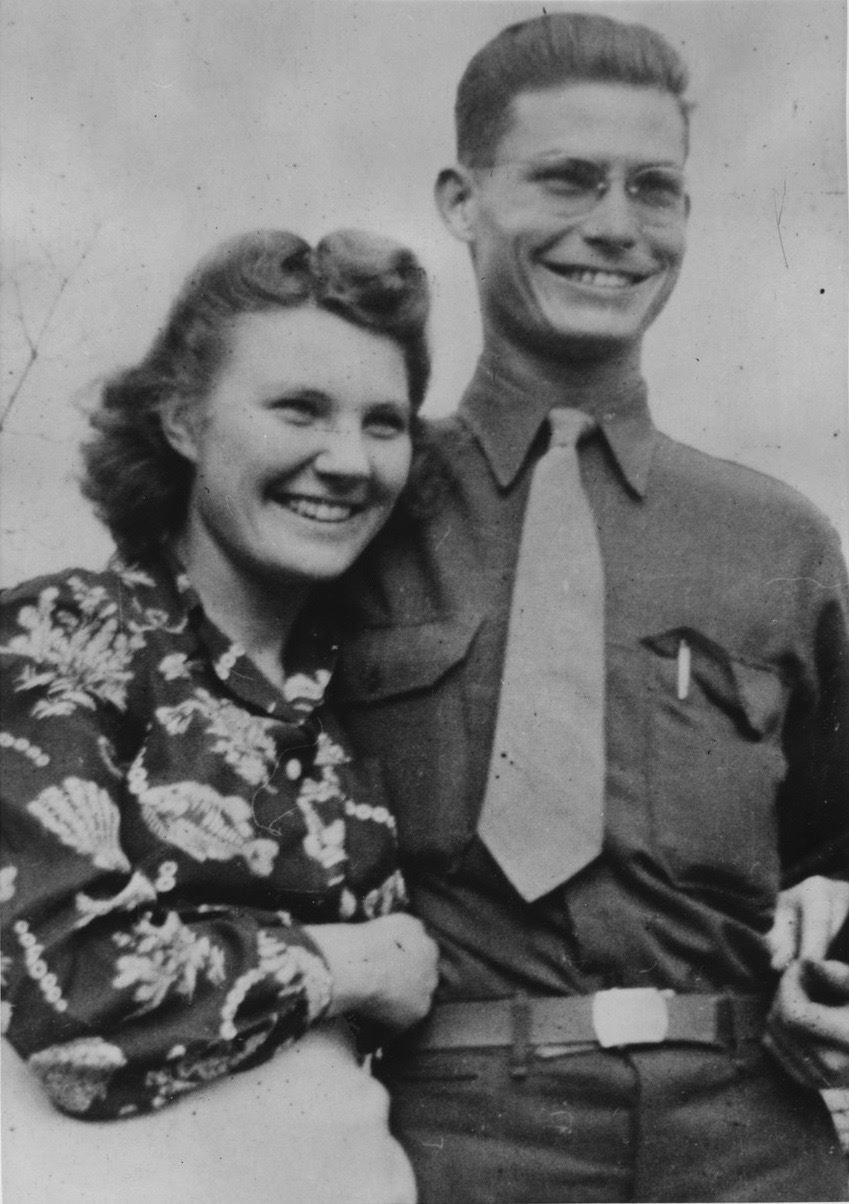 Desmond Doss and his wifefindagrave.com
Desmond Doss and his wifefindagrave.com
The selflessness and valiancy of Desmond Doss had shown to be a great gift. Throughout his life, he strove to serve and protect his country, even at the expense of his own life. His goal to safeguard and to assist has contributed to his dauntless actions. Doss has been an inspiration to others by sticking up for what he believed in, and never giving up when chaos had flown his course. Desmond Doss’ actions have proven to be the pinnacle of heroism.
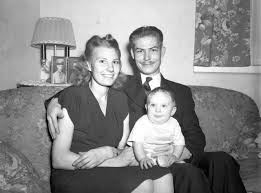 Desmond Doss, his wife, and his child1940sradio.com
Desmond Doss, his wife, and his child1940sradio.com
Desmond Doss: The Real Story, desmonddoss.com/bio/bio-real.php.
"In 'Hacksaw Ridge,' A War Hero Changes Attitudes About Conscientious Objectors." All Things
Considered, 7 Nov. 2016. Biography in Context,
https://link.galegroup.com/apps/doc/A473611886/BIC1?u=powa9245&xid=2bc0b948.
Accessed 12 Feb. 2018.
"PFC. DESMOND DOSS: THE UNLIKELY HERO BEHIND 'HACKSAW RIDGE'."
States News Service, 28 Feb. 2017. Biography in Context,
https://link.galegroup.com/apps/doc/A484395112/BIC1?u=powa9245&xid=b4488ee1. Accessed 12 Feb. 2018.
The Bible. New International Version, 2011.
Page created on 2/16/2018 5:03:43 AM
Last edited 2/16/2018 6:49:38 AM
